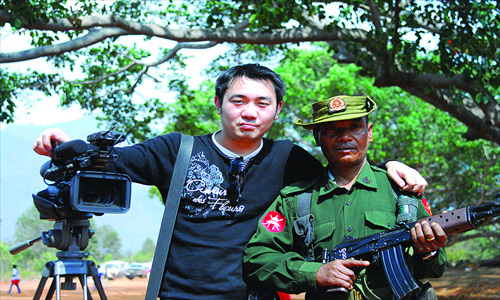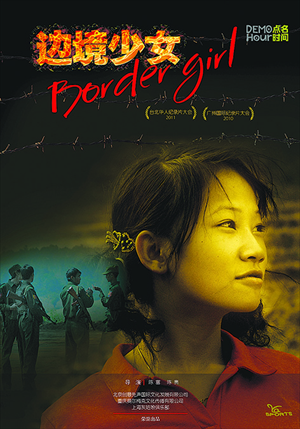Shooting higher



Having always borne an enthusiasm for going into the battlefield, independent director Chen Fu chose Kokang, a self-administered zone in Myanmar, as the setting for a signature picture that would realize his dream. Despite difficulties and even danger, he has accomplished what he set out to do, recording the world, few can capture, in the documentary, Border Girl.
The film is about a Kokang girl named Yang Meiqing who hopes to change her fate by crossing the border into China's Yunnan Province. When Chen, 30, together with his brother and co-producer Chen Gui, began recording her story in 2009, Yang was only 14 years old.
After the documentary was finished in 2012, it won the Silver Award from the Hong Kong iSUNTV Chinese Documentary Awards.
The recognition, he hopes, takes him one step closer to his biggest dream - to become a famous international filmmaker.
From the page to the lens
Born in the county-level city of Jianyang, Sichuan Province, Chen has been fascinated with film since his childhood. In 2000, he was admitted into the Meishi Film Academy at Chongqing University.
Though film is clearly his passion, he began his career as an investigative journalist for the Times & Truth News, a weekly newspaper based in Chongqing. Even then, Chen was interested in issues like the environment, animal rights and war.
"I like reading investigative reports. After failing to find a job relating to film shooting after graduation, I got a job as a reporter, while continuing to study film at the university," he said.
Thanks to his four-year experience working as a reporter, he was able to gather first-hand material for his first documentary, Oasis.
This work, which he made with fellow director Shen Shiping of Chongqing Television, was finished in 2008. The film won Chen several awards, as well as his first taste of fame.
In the film, an old man insists on staying in his hometown, Minqin of Gansu Province, despite the fact that it is being swallowed up by desert and all the other villagers have left.
In 2009, he turned his lens to Kokang, an ethnically unique region in northeastern Myanmar.
"After seeing many newspaper reports and photos, I became very interested in and curious about the war-torn region, where people speak Chinese and are very poor - they even have no real nationality," he said.
Kokang, located in Asia's Golden Triangle and formerly notorious for its opium production, is now known for its gambling. Its people are of Han Chinese descent, and their ancestors came to settle the area after the Ming Dynasty (1368-1644) was toppled.
Modern inhabitants, numbering about 200,000, grew poppies to earn a living until 2002 when the crop was banned. The region has suffered financially since.
Given the poor living conditions, most residents believe their only chance for a better fate is to steal into another country, mainly China.
Let the record show
Chen was startled to find that locals in Kokang lived the way Chinese people did in the 1960s. "Their houses are really shabby, and for most children, the highest education level is high school," he sighed, adding that Yang only finished primary school.
So far, Chen has been to Kokang six times, and he has gone there for Spring Festival for the last three years.
He made his first visit in October 2009, just two months after armed conflicts occurred between the Myanmese army and Kokang soldiers. It was more challenging to record the aftermath than he'd imagined. "I was not that courageous, and I was worried about possible dangers every day," said Chen, adding he didn't dare pull out his camera on his first day in Kokang after seeing armed Myanmese soldiers in the street.
The filmmaker knew he needed protection from local soldiers, and that meant getting the approval of Bai Suocheng, chairman of Kokang. With the help of a casino boss surnamed Zhang who was fed up with war, he met with the official in person.
"I have no official background, and I won't judge the war as good or bad. I just want to take video footage, which could be a valuable historical material in the future," Chen said, recalling how he won over Bai, who even arranged a man to be his bodyguard and guide.
Reaching maturity
Border Girl is Chen's first documentary as an independent director, costing about 200,000 yuan ($32,160). His previous two documentaries, Oasis and Don't Cry, the Three Gorges, were funded by a project supporting young directors.
Still a greenhorn, Chen said he needs a "push" sometimes, especially from experienced directors. "I'm recording a documentary, but I don't know when to finish, and I'm wondering whether to continue recording or just edit it," he recalled what he asked Mark Harris, a well-known American director in a training class for new directors. Harris advised Chen to begin editing and to get his film finished soon. It paid off. The documentary was Border Girl.
Thus far, Border Girl has won awards with prize money totaling more than 600,000 yuan. In addition, several outfits have contacted Chen to buy the rights to the film, including a major Chinese online video website youku.com. The rising star says he has recently signed a contract with an agency in Hong Kong that has agreed to give him 50 percent of the profits from the DVD sales of his film.
"I don't want to be a director that caters to Western tastes and purposely focus on the dark side of Chinese society. The entire world is interested in stories of personal struggle and issues of the environment," he said.
For his next project, he plans to record several people who have been awarded State compensation after being wrongly convicted of crimes.
"Documentaries are like photo albums for a country. It will be interesting to watch what I've recorded in 10 or 20 years," he said proudly. But his greatest dream is to become a master of filmmaking. "I've always wanted to be a good director, shooting films of my own, and expressing my thoughts and feelings," he said.